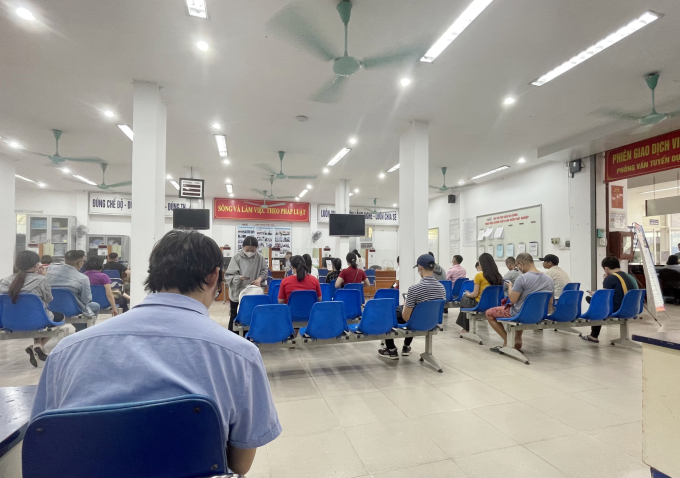Thanh Tung thought his job interview went well and his unemployment would finally end, but he was eventually turned down for the position because he was “too old.”
The 37-year-old game artist in Go Vap District, HCMC was laid off at the beginning of the year, only a few months after he started working for a game design company.
He was disappointed, but he didn’t feel rushed and pressured because he still had savings and income from his freelancing jobs, which he thought would be enough to cover his living expenses until he found a new job.
But finding work was not as easy as he thought.
After three months of job searching, he’d been able to land only a few screening calls and no potential employer had wanted to make an interview appointment with him. Compared to that, around 60% of the companies he applied to last year scheduled interviews with him.
When he eventually got an interview with a game company, he was turned down because of his age. The chief marketing officer of the company, who was 27, said people of Tung’s age might “be stubborn and find it hard to adapt.”
He disagreed with this comment, explaining that he was always willing to improve himself, and he could prove that during a probationary period, to which the interviewer said: “You seem to disagree with a lot of things we have discussed throughout our interview. I’m afraid that if we work together, you will not follow my orders.”
Tung gave up. He now believed in age discrimination at the workplace. And future experience only confirmed things further.
“Then I got a phone call from a friend of mine who was working as a headhunter,” he says. “That friend saw my profile and confirmed that my age was preventing me from getting called for interviews.”
 |
|
People registering to receive unemployment compensation at the Hanoi Center for Employment Services on June 20, 2023. Photo by VnExpress/Phan Duong |
Many middle-aged workers are struggling to find jobs. Tra My, a former construction engineer, said she felt hopeless as she had been unemployed for over six months and had to attend a job fair as one of her many efforts to find a career opportunity. She also said she was learning a foreign language and studying software at age 45, hoping that doing so would increase her chances of finding a job.
Van Quang, 53, was working as a delivery man for a third the salary of his previous job as a warehouse supervisor at a Hanoi-based supermarket. He chose the path after repeated failed attempts looking for vacancies similar to his former positions.
Thanh Hien, 45, told VnExpress that all of the job announcements she came across were looking for applicants under 35 only.
Hien had never thought she would have to search for a job, as she had always worked at a state-owned company. But in March, her employer’s business problems forced Hien to get laid off.
Hien tried to bargain by offering to cut her salary down to VND5.6 million (around $237), a third of what it had been.
“But the company insisted on cutting down on middle-aged workers,” she recalls. “They asked me to sign another contract, in which my position was changed from an accountant to housekeeping staff.”
Hien told the company she would consider the offer. She hadn’t even given her final decision yet when the company informed her they would lower her salary from VND5.6 million to VND4.9 million. She had no other choice than to quit.
Age is one of the strongest barriers for those working in Vietnam. VnExpress reporters at a late-June job fair in Hanoi’s Gia Lam District observed there were almost no gender preferences mentioned in job announcements, while age requirements were nearly ubiquitous. Among the job announcements by the 36 companies at the fair, 41% of them targeted the 18-25 age group and 35% targeted the 26-35 age group, compared to 24% targeting the 36 and over age group.
There have been ongoing factory workers layoff in southern Vietnam, starting late-2022. According to data, the majority of the workers laid off were middle-aged females. For example, over 50% of those laid off at the HCMC-based company Pouyuen were over 40 and around 60% of them had worked at the company for at least 10 years.
Responding to a survey conducted by VnExpress late-June, as many as 90% of the respondents answered “Yes” to the question: “Do you think workers aged between 35 and 40 in Vietnam struggle to get a job?”
Pham Minh Huan, former deputy minister of Labor, Invalids and Social Affairs, considers age discrimination at workplaces a downside of the market-oriented economy, in which businesses have to optimize their human resources to maximize their productivity and minimize their costs, which in turn makes aged low-skilled workers the first target to be laid off.
“Aged workers tend to have lower productivity while requiring higher salaries,” Huan explains. “Businesses that revolve around financial reward are likely to lay this group of workers off, even if they have contributed to the company for a long time.”
Nguyen Phuong Mai, former CEO of Navigos Search, a recruiting service in Vietnam, says employing middle-aged workers has both strengths and challenges. On the one hand, employers don’t have to spend too much on training costs and could be able to make use of these workers’ experience. On the other hand, middle-aged employees may be less creative, less flexible, less familiar with technologies, and less likely to blend in with co-workers of younger generations.
Mai tells VnExpress a story which she will never forget: “I once worked with an outstanding applicant who met all of the requirements that the company was looking for.”
“But he still got turned down, as throughout his whole career up until that moment, he had worked for one company only, which was considered a sign that it may be hard for him to adjust and adapt.”
 |
|
Hien (far R) leaves an employer her personal information at a job fair. Photo by VnExpress/Phan Duong |
Experts suggest that workers have to constantly improve their skills and be ready for every possible scenario regardless of their age, in order to be able to grab opportunities that come to them.
Huan also says the government should create a varied labor market, so that middle-aged people could change their jobs more easily if they are laid off.
He suggests businesses appreciate workers that have dedicated their youths to the companies and treat them with respect, including avoiding sudden layoffs without any kind of compensation.
“Middle-aged people may find it challenging to start over, but that doesn’t mean it’s impossible,” he says.
Tung’s recruiter friend pointed out things he needed to change in his Curriculum Vitae, including removing his year of birth and irrelevant degrees while emphasizing more his practical skills.
He was also suggested to reply “I want to be an employee till I retire” when interviewers asked about his career goal, instead of showing his determination to achieve a leading position.
Tung indeed got more calls for interviews after adapting his application documents based on his friend’s suggestions. His unemployment period ended in May. He now works for a foreign company that he says “values skills over age.”
Hien is still looking for a new job. She says if things do not work out, she will consider lowering her requirements regarding salaries and benefits.
- Reduce Hair Loss with PURA D’OR Gold Label Shampoo
- Castor Oil Has Made a “Huge” Difference With Hair and Brow Growth
- Excessive hair loss in men: Signs of illness that cannot be subjective
- Dịch Vụ SEO Website ở Los Angeles, CA: đưa trang web doanh nghiệp bạn lên top Google
- Nails Salon Sierra Madre
 VnExpress News The News Gateway of Vietnam
VnExpress News The News Gateway of Vietnam




